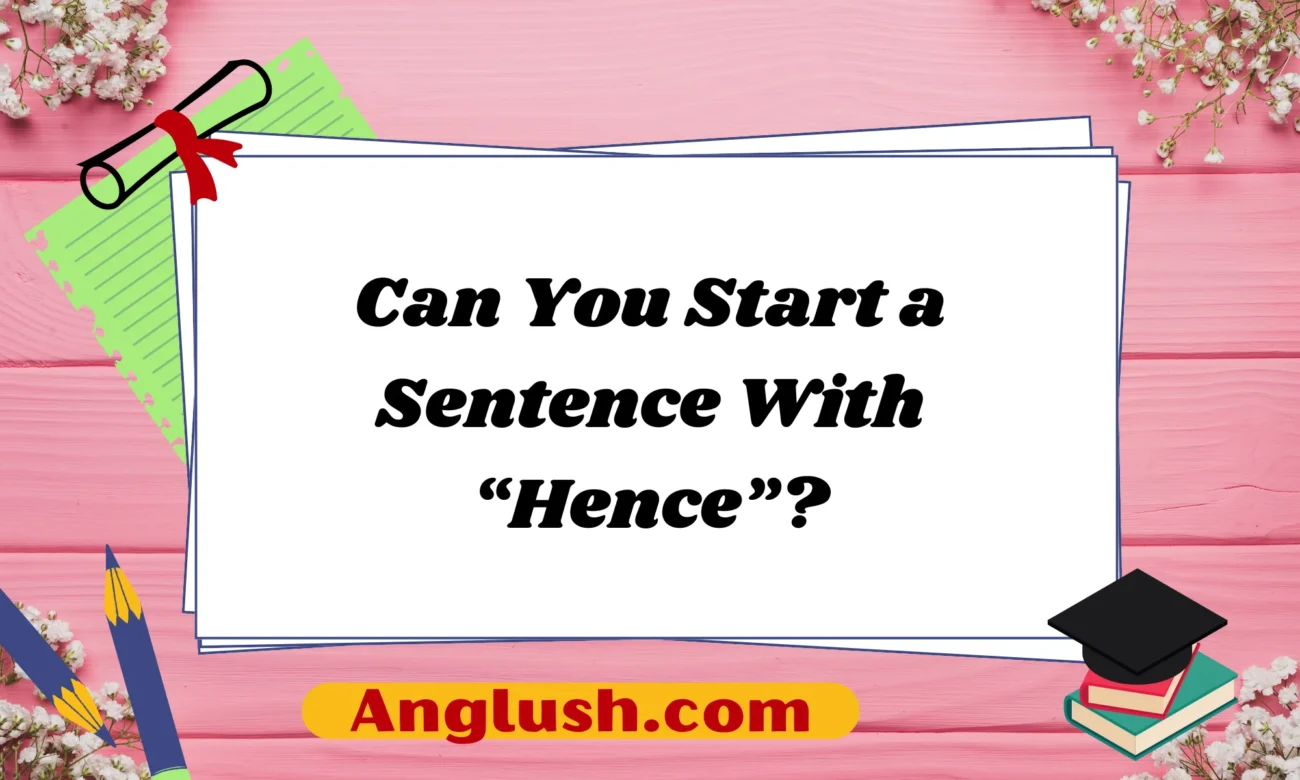Introduction
The English language is rich and complex, offering a variety of ways to express ideas and transition between thoughts. One word that often raises questions is “hence.” Can you start a sentence with “hence”? The short answer is yes, but it depends on the context and formality of the writing.
This article will explore the proper use of “hence” at the beginning of a sentence, alternatives based on different tones, and how to choose the best word for professional, academic, and casual settings. We will also include ten texting-friendly examples that are optimized for readability and engagement.
Understanding “Hence”
“Hence” is an adverb that means “as a result,” “from this time forward,” or “for this reason.” It is commonly used in formal writing, academic contexts, and logical arguments.
Examples of “Hence” in a Sentence
- The company was losing revenue; hence, major changes were necessary.
- He was caught cheating; hence, he was disqualified from the competition.
- The storm is approaching; hence, we must evacuate immediately.
While “hence” is grammatically correct at the beginning of a sentence, it often sounds formal or old-fashioned. In everyday speech and informal writing, alternatives may be more appropriate.
Can You Start a Sentence With “Hence”?
Yes, you can start a sentence with “hence,” but it’s more common in academic, legal, and formal writing. In everyday communication, using words like “therefore” or “thus” may sound more natural.
When to Use “Hence” at the Start of a Sentence
- In formal or academic writing
- Example: Hence, further research is needed to support this theory.
- In technical or business reports
- Example: Hence, the company must reevaluate its marketing strategy.
- When making logical conclusions
- Example: Hence, it can be inferred that demand is increasing.
Alternatives to “Hence” Based on Tone
If “hence” feels too formal, here are alternative words that might suit different contexts:
1. Therefore (Formal & Professional)
- Example: He was late to work multiple times. Therefore, he received a warning.
2. Thus (Formal & Academic)
- Example: The experiment was inconclusive. Thus, further research is required.
3. Consequently (Professional & Logical)
- Example: Sales dropped significantly. Consequently, the company had to cut costs.
4. As a result (Neutral & Common in Speech)
- Example: She forgot her umbrella. As a result, she got drenched in the rain.
5. That’s why (Casual & Conversational)
- Example: I didn’t sleep well last night. That’s why I’m so tired today.
6. Because of this (Neutral & Easy to Understand)
- Example: The product received bad reviews. Because of this, sales declined.
7. For this reason (Formal & Persuasive)
- Example: Many citizens are unhappy with the decision. For this reason, protests have begun.
8. Due to this (Professional & Business-Oriented)
- Example: Production costs increased. Due to this, prices were adjusted.
9. So (Casual & Conversational)
- Example: The store was closed. So we went somewhere else.
10. That being said (Professional & Transition-Friendly)
- Example: The new policy has some challenges. That being said, it offers long-term benefits.
Choosing the Right Alternative
Different words carry different tones. Here’s how to choose the best alternative based on your context:
| Alternative | Best For | Tone |
| Therefore | Business, formal essays | Professional |
| Thus | Academic writing, technical papers | Formal |
| Consequently | Cause-and-effect explanations | Logical |
| As a result | Everyday speech, writing | Neutral |
| That’s why | Casual conversations | Informal |
| Because of this | General explanations | Neutral |
| For this reason | Persuasive writing, business | Formal |
| Due to this | Reports, business documents | Professional |
| So | Casual speech, texting | Informal |
| That being said | Transitioning in discussions | Semi-formal |
10 Texting Examples Using Alternatives to “Hence”
Text messages should be concise, clear, and natural. Here are ten texting examples replacing “hence” with more conversational alternatives:
- Formal: “The meeting has been postponed. Therefore, we’ll update the schedule soon.”
- Casual: “I forgot my wallet. That’s why I couldn’t pay.”
- Professional: “The project deadline changed. As a result, we need to adjust our plans.”
- Neutral: “She missed her flight. Because of this, she’ll arrive tomorrow instead.”
- Formal: “New regulations were introduced. Thus, we must update our policies.”
- Casual: “I was out all night. So I’m exhausted today.”
- Business: “There’s a system error. Due to this, we are experiencing delays.”
- Informal: “It started raining. That’s why I’m soaking wet.”
- Professional: “Sales declined. For this reason, we are launching a new campaign.”
- Neutral: “The package was lost. Consequently, a replacement has been sent.”
Final Thoughts
Starting a sentence with “hence” is grammatically correct, but it is often too formal for everyday conversations. Depending on the situation, alternatives like “therefore,” “thus,” “so,” or “as a result” may be more natural and suitable.
When writing, consider the tone and audience before choosing a transition word. Formal settings (academic writing, business reports) might require “hence” or its alternatives, while casual conversations flow better with simpler words like “so” or “that’s why.”
By understanding these nuances, you can ensure your writing is clear, professional, and engaging.Can you start a sentence with “hence”? Learn when to use it, explore alternatives for different tones, and see 10 optimized texting examples for clarity and engagement.

